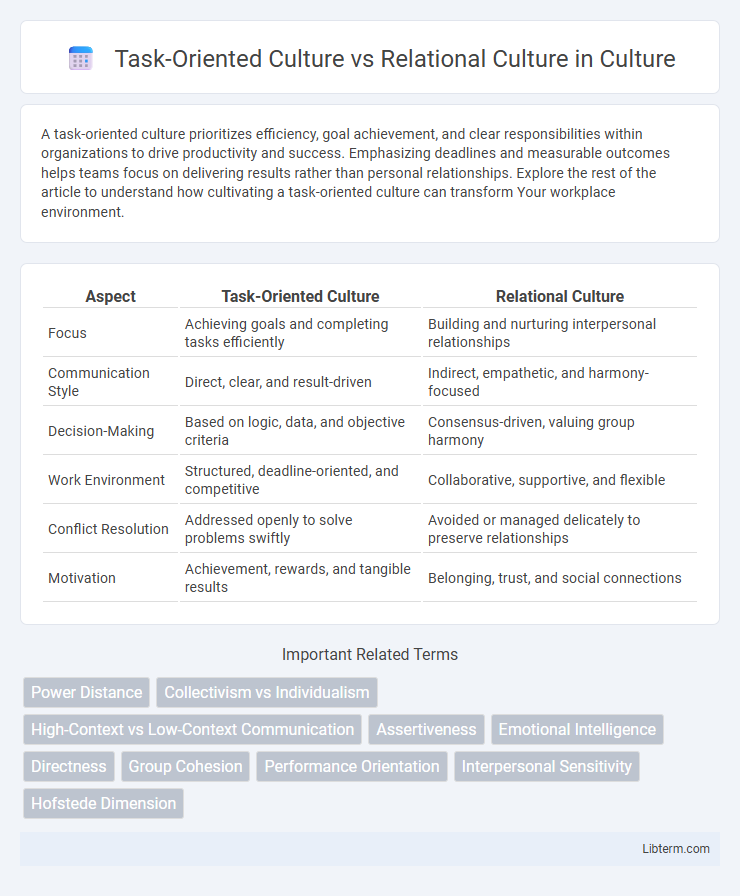A task-oriented culture prioritizes efficiency, goal achievement, and clear responsibilities within organizations to drive productivity and success. Emphasizing deadlines and measurable outcomes helps teams focus on delivering results rather than personal relationships. Explore the rest of the article to understand how cultivating a task-oriented culture can transform Your workplace environment.
Table of Comparison
| Aspect | Task-Oriented Culture | Relational Culture |
|---|---|---|
| Focus | Achieving goals and completing tasks efficiently | Building and nurturing interpersonal relationships |
| Communication Style | Direct, clear, and result-driven | Indirect, empathetic, and harmony-focused |
| Decision-Making | Based on logic, data, and objective criteria | Consensus-driven, valuing group harmony |
| Work Environment | Structured, deadline-oriented, and competitive | Collaborative, supportive, and flexible |
| Conflict Resolution | Addressed openly to solve problems swiftly | Avoided or managed delicately to preserve relationships |
| Motivation | Achievement, rewards, and tangible results | Belonging, trust, and social connections |
Introduction to Organizational Cultures
Task-oriented culture prioritizes achieving specific goals and efficiency, emphasizing structured roles, deadlines, and measurable performance within organizational settings. Relational culture focuses on building strong interpersonal relationships, collaboration, and employee well-being to foster a supportive and cohesive work environment. Understanding these distinct organizational cultures is essential for aligning management strategies with company values and workforce dynamics.
Defining Task-Oriented Culture
Task-oriented culture emphasizes efficiency, goal achievement, and productivity by prioritizing tasks over interpersonal relationships within organizations. This culture drives employees to meet deadlines, adhere to processes, and focus on quantifiable outcomes to enhance overall performance. Teams operate with clear expectations and structured workflows, reducing ambiguity to maximize operational effectiveness.
Defining Relational Culture
Relational culture emphasizes building strong interpersonal connections, trust, and collaboration within teams by prioritizing emotional bonds and mutual support over individual tasks. It fosters an environment where open communication and empathy drive group cohesion, leading to enhanced cooperation and collective problem-solving. Organizations with a relational culture often experience higher employee satisfaction and loyalty due to the focus on social dynamics and shared values.
Core Values and Principles
Task-oriented cultures prioritize efficiency, goal achievement, and clear roles, emphasizing punctuality, productivity, and measurable results as core values. Relational cultures focus on building trust, strong interpersonal relationships, and community cohesion, valuing harmony, loyalty, and mutual respect. These principles shape communication styles and decision-making processes within organizations and social groups.
Leadership Styles in Both Cultures
Task-oriented culture emphasizes leadership styles that prioritize goal achievement, efficiency, and clear role definitions, often featuring directive and transactional leaders who focus on task completion and performance metrics. Relational culture values leadership approaches that foster interpersonal relationships, collaboration, and emotional intelligence, with transformational and servant leaders promoting trust, team cohesion, and employee well-being. Effective leadership in task-oriented cultures drives productivity through structure and accountability, whereas in relational cultures, leadership thrives by nurturing connections and motivating through empathy.
Communication Patterns and Practices
Task-oriented cultures prioritize direct, explicit communication to achieve specific goals efficiently, often favoring structured interactions and clear deadlines. Relational cultures emphasize harmony and interpersonal relationships, using indirect communication, context, and nonverbal cues to maintain group cohesion. The contrast in communication patterns affects negotiation styles, conflict resolution, and decision-making processes within organizations.
Decision-Making Approaches
Task-oriented culture emphasizes efficient, structured decision-making processes focused on achieving specific goals and outcomes, often relying on data, logic, and hierarchical authority. Relational culture prioritizes collaborative decision-making, valuing interpersonal relationships and consensus to ensure harmony and group cohesion. Decision-making in task-oriented environments tends to be quick and directive, whereas relational cultures employ more inclusive and consultative approaches.
Impact on Team Performance
Task-oriented culture emphasizes clear goals, deadlines, and individual responsibilities, which enhances efficiency and productivity by aligning team efforts with specific objectives. Relational culture prioritizes relationships, collaboration, and emotional support, fostering trust and communication that can improve morale and creativity. Balancing both approaches often leads to optimized team performance by combining structure with strong interpersonal connections.
Potential Challenges and Solutions
Task-oriented cultures often face challenges such as rigid hierarchies and reduced team cohesion, which can hinder collaboration and innovation. Solutions involve fostering open communication channels and integrating team-building activities to balance efficiency with interpersonal relationships. Relational cultures may struggle with decision-making delays due to consensus-seeking, mitigated by establishing clear roles and setting time-bound objectives to enhance productivity.
Choosing the Right Culture for Your Organization
Selecting the right organizational culture hinges on aligning with your business goals and employee dynamics; a task-oriented culture emphasizes efficiency, clear objectives, and measurable outcomes ideal for performance-driven environments. Conversely, a relational culture fosters collaboration, trust, and strong interpersonal relationships, enhancing employee satisfaction and innovation in people-centric industries. Understanding your organization's priorities and workforce needs will guide the strategic decision between task-oriented and relational cultures to optimize productivity and engagement.
Task-Oriented Culture Infographic

 libterm.com
libterm.com